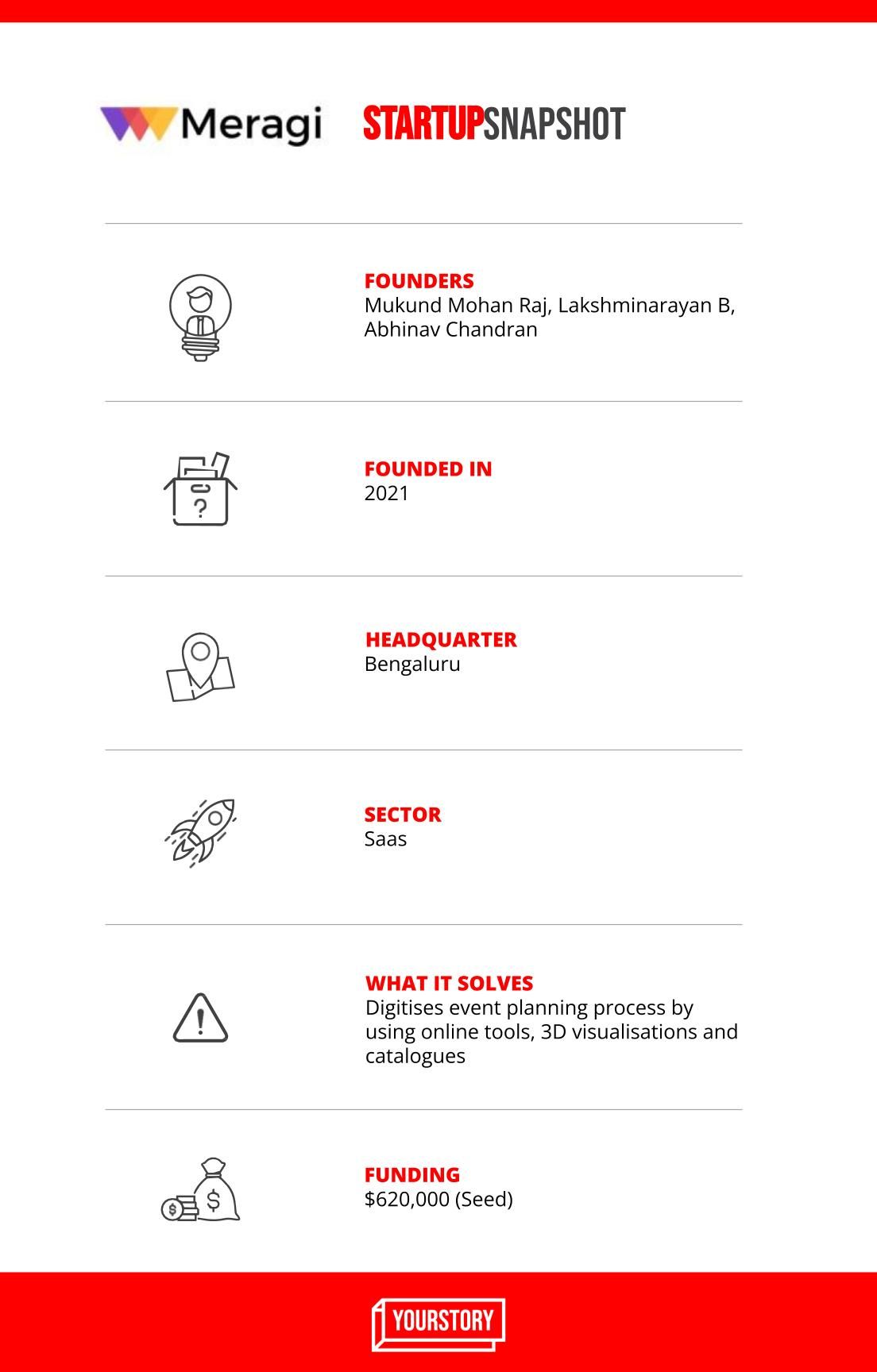Planning and organising a celebration or an event can sometimes feel more like a project deadline rather than a special date on the calendar. Enter online event planning startup Meragi, which serves as a one-stop shop for everything needed to organise an event.
“Planning a celebration such as a wedding should be an experience to enjoy and savour,” says Abhinav Chandran, Co-founder of Meragi, in a conversation with YourStory. “But in reality, you have to deal with the hassle of discovering, evaluating and finalising vendors and designs across seven to eight different categories,” he adds.
To make matters worse, more often than not, only half of your expectations are met.
In April 2021, Abhinav teamed up with his former co-workers Lakshminarayan B (Laksh) and Mukund Mohan Raj to start in Bengaluru.
What does the platform do?
Meragi was founded with the vision to simplify planning celebrations by digitising the entire event planning process. On its platform, customers can browse through multiple catalogues, as well as collaborate and plan their special day according to their budget. The platform works as a central resource for finding custom decorations, catering, makeup, and more.
“To help customers browse and select the right products and services, we provide a dedicated planner at no extra cost,” Abhinav says. With online tools and 3D visualisations, the planners help customers to find the best solutions for their celebration.
Coming with experience in sales and marketing, the trio dabbled with the idea of Meragi for months before taking the plunge.
“We then brought on board a wedding planning expert (Roseline David) and hired a strong team of designers, architects, and 3D artists, and now we have close to 20 people in our team,” he adds.
Starting from Livspace
The trio previously worked with Livspace, solving the problem of organising the interior design industry. While Lakshminarayan handled the sales department of Livspace, Mukund was the head of operations and Abhinav was the Director of Product for the company. During that process, they had realised that some of the solutions they developed there were very relevant for the weddings and event space, which they found surprisingly similar to the interiors industry.
“After speaking to friends and family who had recently got married, and through our own experience as well, we realised that there is tremendous scope to modernise this industry which, despite being a very large market, has seen little development to benefit the end customer,” explains Laksh.
He further explains during COVID-19, people chose to spend less because of the cap on the number of attendees, and preferred planning ceremonies and attending the event virtually.
“Our offering focuses on value designs rather than the expensive high-end designs. So, we are perfectly placed to cater to the requirement of those customers who are looking for designs that are easy on the wallet as much as it is on the eye. Also, as part of our digitisation efforts, we do all the interactions online and virtually, thereby removing the need to meet in person, and this has been a big hit among our customers where more than 90 per cent of our interactions currently are all online,” Laksh adds.
Mukund says the challenge was breaking through in an unorganised sector and keeping the sale of products, services and solutions all in a single transaction. To digitise this, the key was to set up a structured catalogue and list all the products, services and solutions in one place with standard rates which makes it easy for our customers to consume.
Along with a virtual catalogue of designs to choose from, Meragi uses tools to customise the designs as per the customers’ demands. It also uses 3D visualisation tools for customers to view the exact design before placing the order.
Market and competition
According to several reports, the global virtual event platform market size is expected to grow at a Compound Annual Growth Rate (CAGR) of 12.7 per cent during the forecast period, to reach $18.9 billion in 2026 from $10.4 billion in 2021.
Some of the players in the space include Hubilio, Zuddl, and Airmeet to name a few.
Despite being fairly young, the platform has booked more than 80 customers and organised more than 50 events to date. Mukund adds that the platform targeted working professionals who did not have the time or exorbitant budget for lavish ceremonies like weddings.
But the team understands its challenges as well. “Building something like this without previous experience in a similar market is quite hard since the model itself is very novel with very few startups such as Livspace having pioneered it successfully,” he says.

Funding and future
Meragi raised $620,000 in a seed funding round led by venture capital firm Venture Highway. The round also saw the participation of Livspace founders – Ramakant Sharma and Anuj Srivastava.
The platform has marked 40 per cent month-on-month growth in customer acquisition. Its gross merchandise value (GMV) also went over $500,000 within seven months of operation.
The team plans to raise funding worth more than $50 million in the next three to four years to scale past an annualised revenue of $100 million. With its official app launching in the first half of 2022, Meragi plans to diversify and delve further into the ecosystem of digital event planning.
(With inputs from Sindhu Kashyaap)
Edited by Kanishk Singh


